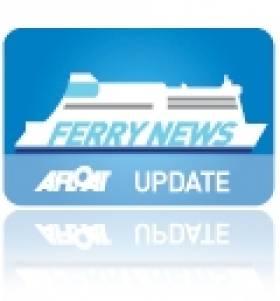Displaying items by tag: Baltic Ferry
Celtic Link Ferries First Ferry Goes to the Breakers
Launched as the Stena Tranporter, the career of the 16,000 tonnes has spanned over three decades in which the 151m vessel changed through several owners and subsequent vessel renamings.
It was when she served under the name Baltic Ferry, that her most notable career took place in 1982 during her wartime deployment as part of the
Falklands Islands Task Force. The 151m vessel was requisitioned by the British Ministry of Defence which saw the ship engaged in military operations when RAF Harrier Jump-Jet aircraft transferred store supplies from the deck of the ship as part of the war-effort in the South Atlantic Ocean.
In 2001 the vessel undertook ferry operations to Ireland as the European Diplomat on the Dublin-Liverpool route for the P&O (Irish Sea) route network. The following year she was transferred on the direct route to France until P&O pulled the plug on the continental service in December 2004, leaving Irish Ferries as the sole operator.
It was not until February 2005 that the route resumed service but this time under new owners Celtic Link Ferries. The O'Flaherty brothers, owners of a large fishing fleet in Kilmore Quay purchased the vessel and renamed her Diplomat. See PHOTO.
For the next four years she built up a steady customer loyalty between freight-hauliers drivers and car-only accompanying passengers who were accommodated in the ship which had a limited passenger certificate for 114 passengers. In addition she had a license to transport livestock.
Currently Celtic Link Ferries operate the ferry Norman Voyager but the 800-passenger / 200-car ro-pax vessel will only remain on the route until an October debut of a larger sistership the Cartour Beta.
The vessel is running this season between Italy and Sicily and with an added deck the 27,552 tonnes vessel has an increased capacity for passengers, cars and enhanced range of facilities. Recently the company had run a competition to name the new vessel which is to begin a five-year charter on the service between Wexford and Normandy.
- Wexford
- irish sea
- Diplomat
- Celtic Link Ferries
- Kilmore Quay
- Stena Rederi
- Marine Express
- RosslareCherbourg
- Norman Voyager
- Ports and Shipping News
- Normandy
- RoPax
- DublinLiverpool
- P&O (Irish Sea)
- Ferry news
- Cartour Beta
- Irish Sea Ferries
- Stena Transporter
- Baltic Ferry
- European Diplomat
- O'Flaherty Brothers
- Falklands Islands Task Force
- Hyundai Heavy Industries
- Freighthauliers
- Livestock
- RAF
- Harrier JumpJets
























































